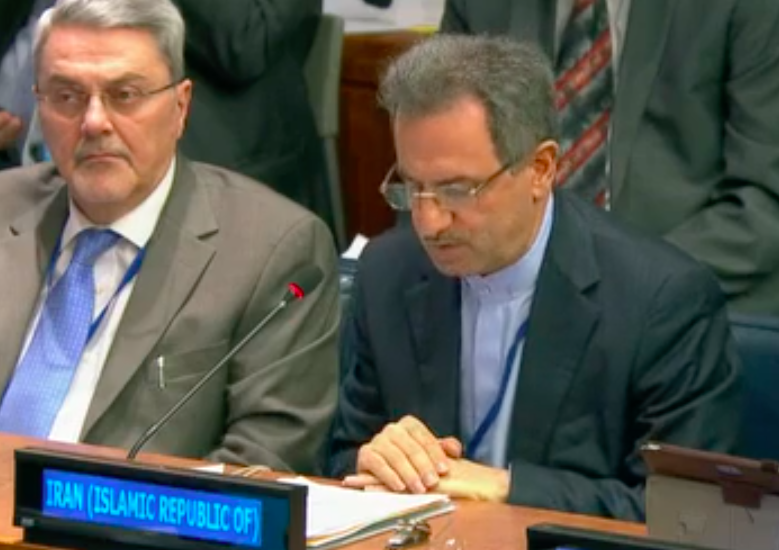Iran Defends Its Record on Supporting Persons With Disabilities But Serious Discrimination Persists

The head of the Welfare Organization of Iran Anoushirvan Mohseni-Bandpey at the annual Conference of State Parties to the Convention on the Rights of Persons with Disabilities.
At the 11th annual session of the Conference of State Parties to the Convention on the Rights of Persons with Disabilities held at the United Nations headquarters in New York (June 11-14, 2018), the head of the Welfare Organization of Iran (WOI), Anoushirvan Mohseni-Bandpey, gave a speech on Iran’s actions and achievements in defending the rights of persons with disabilities.
Iran is a signatory to the Convention on the Rights of Persons with Disabilities.
In his speech on Tuesday, June 12, Mohseni-Bandpey emphasized Iran’s recent success in creating job opportunities for people with disabilities. He noted that the government is providing health insurance to persons with disabilities and paying a monthly stipend, while also allocating them three percent of job openings in government agencies. In addition, he said the Law for the Protection of the Rights of Persons With Disabilities was ratified in Iran in April 2018.
However, the WOI chief did not provide a response to the 69 recommendations and concerns expressed by the Committee on the Rights of Persons with Disabilities (CRPD) to the Iranian authorities in 2017.
The Islamic Republic of Iran had been asked to act on violence prevention, eliminating derogatory language in Iranian laws and enforcing Article 66 of Iran’s Criminal Procedures Regulations. More than a year later, the government has not taken any action in those areas, and persons with disabilities in Iran also continue to face severe discrimination and lack of accessibility in public facilities and services.
In his UN speech, Mohseni-Bandpey pointed out Iran’s cooperation with other countries as well as non-governmental organizations in improving the condition of persons with disabilities.
He said 1.4 million persons with disabilities had registered with the WOI and added: “Administration accessibility measures in the public and private places for persons with Disability and Special Needs through the accessibility function with the organization.”
Despite the WOI director’s talk about greater job opportunities, many people with disabilities will not be able to compete for jobs in the Education Ministry’s nationwide test in July 2018. According to the job application requirements of Iran’s National Organization of Educational Testing for prospective teachers, the vast majority of the hearing impaired and blind people would not be allowed to take the test.
Persons with disabilities are covered by the WOI’s health insurance but it does not include the cost of many basic and necessary treatments such as speech therapy.
Millions of women with disabilities face double discrimination
In his remarks to the Conference of State Parties to the Convention on the Rights of Persons with Disabilities in New York, UN Secretary-General António Guterres emphasized the importance of the convention.
“This Convention protects the rights of some 1.5 billion people around the world, and is one of the most widely-ratified international human rights treaties, with 177 ratifications since its adoption in 2006,” he said.
“It is a historical commitment which reaffirms that people with disabilities are entitled to exactly the same rights as everyone else, and that societies must be organized so that all people, including those with disabilities, can exercise their rights freely,” Guterres added.
“But signing and ratifying the Convention is not enough. Implementation is essential. Countries must apply the Convention to their development policies, investments and legal systems, if we are to fulfil the central pledge of the 2030 Agenda for Sustainable Development: to leave no one behind.”
Emphasizing the disproportionate discrimination against women and girls with disabilities, Guterres said: “Every minute, more than 30 women are seriously injured or disabled during childbirth.
“Women and girls with disabilities face multiple barriers to accessing education, health services and jobs. Without women’s empowerment and gender equality, millions of women will continue to suffer from double discrimination based on both their gender and their disability.”
In conclusion, the UN secretary general said the gathering in New York “is an opportunity to reflect on gaps and identify concrete steps to implement the Convention on the Rights of Persons with Disabilities in full, and in a timely way.”
In addition to member states, the annual conference is attended by NGO representatives who share their experiences on helping persons with disabilities. Difficulties facing women with disabilities, the mentally disabled and the rights of prisoners with disabilities were among the topics of discussion this year.
